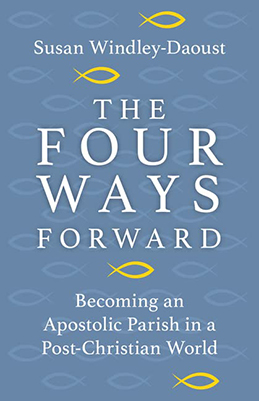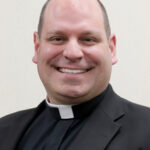Author suggests ‘Four Ways Forward’ for parishes in our post-Christian world

Reviewed by Father Luke Spannagel
If you are keeping up with the books Bishop Lou is sharing with the priests, then perhaps you are ready for the next one on the list: “The Four Ways Forward” by Susan Windley-Daoust. She is the director of missionary discipleship for the Diocese of Winona-Rochester in Minnesota.
As the subtitle suggests — “Becoming an Apostolic Parish in a Post-Christian World” — Windley-Daoust begins with a look at the picture many of us are seeing in our parishes and in the world. She then continues with four models for evangelization in this post-Christian world we find ourselves in, hopefully helping us to chart a pathway as we look to the future.
The combination of parishes not often being as welcoming as we think we are, along with a general sentiment of distrust for institutions, means that we need to be dedicated to consistently keeping what she calls “radical hospitality” at the forefront and Jesus at the center.
Statistics and observations on the state of the church and our people may leave us discouraged and maybe even overwhelmed. Windley-Daoust personalizes these observations from her previous experience as a professor, noting that many students shared a “general sentiment: I am sad, wounded, and Jesus Christ is not an option on the table for me.”
Upset by such student responses, she turned to prayer, asking why they couldn’t just take themselves to church. The response she received helped her recognize that the students didn’t need her teaching but something else: “They are too wounded to do that. They need their wounds attended, not instruction.” Windley-Daoust shares what many have begun to recognize, the problem is not just a matter of better and more thorough catechesis but one of needing to introduce people to the Person of Jesus . . . helping make the kind of introductions that enable a true relationship to grow.
“FOUR EMERGING MODELS”
In “four-emerging models,” Windley-Daoust lays out what she sees as a fruitful response to the needs of our people today. These models are described well in the preface:
- The Radical Hospitality and First Proclamation model — “focuses on the marriage of sharing the Gospel message with a ‘shallow entry’ (or ‘begin with the basics’) environment offering warmth, food, and friendship, no strings attached. This model trains and facilitates people in listening and offering the kerygma, or the basic proclamation that Jesus Christ is truly human and truly God, and has a plan to meet you, love you, and change your life.”
- The Spiritual Multiplication Small-Group model — “focuses on the art of accompaniment and Christian friendship, but with an evangelization twist: We are by baptism called to evangelize, and that means not just engaging in a small group for our own sanctification, but going out and proposing the Gospel to others and accompanying them on the Christian road.”
- The Organizational Mission (Re)focus model — “challenges parishes to restructure to facilitate mission. Field hospitals look different from university medical centers. How would parishes look different if everything was measured by how they helped the greater community — not just the people attending on Sunday — to know Christ?”
- The Signs and Wonders model — “comes straight out of the Acts of the Apostles. The apostles shared the Gospel with signs and wonders that pointed to the power of God. The model in the 21st century can look very much the same in churches influenced by the charismatic renewal, but the model is present in other ways as well: in churches that put a focus on sharing personal witness, and churches that focus on Eucharistic adoration.”
Throughout the remainder of the book, Windley-Daoust describes these models in greater detail, sharing additional resources and victory stories from those who have been working/thinking/praying about discipleship and evangelization.
CALL FOR “RADICAL HOSPITALITY”
Windley-Daoust offers some direct challenges to thinking parishes can solve these problems with programs, as well as some recently familiar challenges that hospitality and welcome need to precede “signing up” and teaching. The combination of parishes not often being as welcoming as we think we are, along with a general sentiment of distrust for institutions, means that we need to be dedicated to consistently keeping what she calls “radical hospitality” at the forefront and Jesus at the center.
The author also provides many practical tips, including suggestions for pastors in preaching, assembling groups of people to help in leadership/implementation, evaluating current offerings, and ideas for ways to help grow the mentality of welcome, invitation, and community. She notes that these transitions will take time and that parishes should expect to employ a combination of at least three of the models presented.
The book wraps up with some sample timelines/activities for different parish structures (larger, linked, clusters), including which models are being used.
EUCHARIST AND EVANGELIZATION
Different from what many of us may have thought, Windley-Daoust notes that Mass may not be a good entry point for people: “The challenge of Catholic Christianity is that the Mass — the ultimate encounter with Jesus Christ on earth — is meant for the initiated. That is, it is meant for the baptized. And reception of the Eucharist is a sacrament for those initiated. Ideally, the Mass is the place to which we lead a person and is not usually the first step we offer them.”
However, in a note that does match with our current participation in the Eucharistic Revival, she references Sherry Weddell (“Forming Intentional Disciples”) who “suggests that Eucharistic adoration is — contrary to the way it is presented in most parishes — ideally suited to shallow entry evangelization and growing discipleship — especially within a post-Christian culture, and especially to our younger, increasingly ‘none’ generations: ‘Adoration appeals to post-moderns because it is experiential, mysterious, and accessible to everyone: the non-baptized, the non-Catholic, the unchurched, the lapsed, the badly catechized, the wounded, the skeptical, the seeking, the prodigal, and those who aren’t sure that a relationship with God is even possible. An acquaintance of mine aptly describes it as ‘Spiritual Radiation Therapy’ because it places the soul in the direct presence of Jesus Christ in the trust that he will act if we leave the door open the merest crack. All it requires is the ability to sit down’.”
During this time of “Growing Disciples” in our diocese, and during this time of Eucharistic Revival, I invite you to spend extra time with Jesus in the Eucharist. Ask Him to deepen your faith; ask for wisdom and guidance for our leaders; ask for good entry and re-entry points for people who have been away . . . or for those who have never known the love of Jesus. Ask Jesus to bond us together in His love, and for a vibrant hope for the future of our Catholic Church here in the Diocese of Peoria!
—
FATHER LUKE SPANNAGEL is a member of The Catholic Post’s book review team. He is parochial vicar of St. Mary’s Cathedral, Sacred Heart, and St. Bernard parishes in Peoria and one of 58 priests serving as National Eucharistic Preachers during the National Eucharistic Revival.






